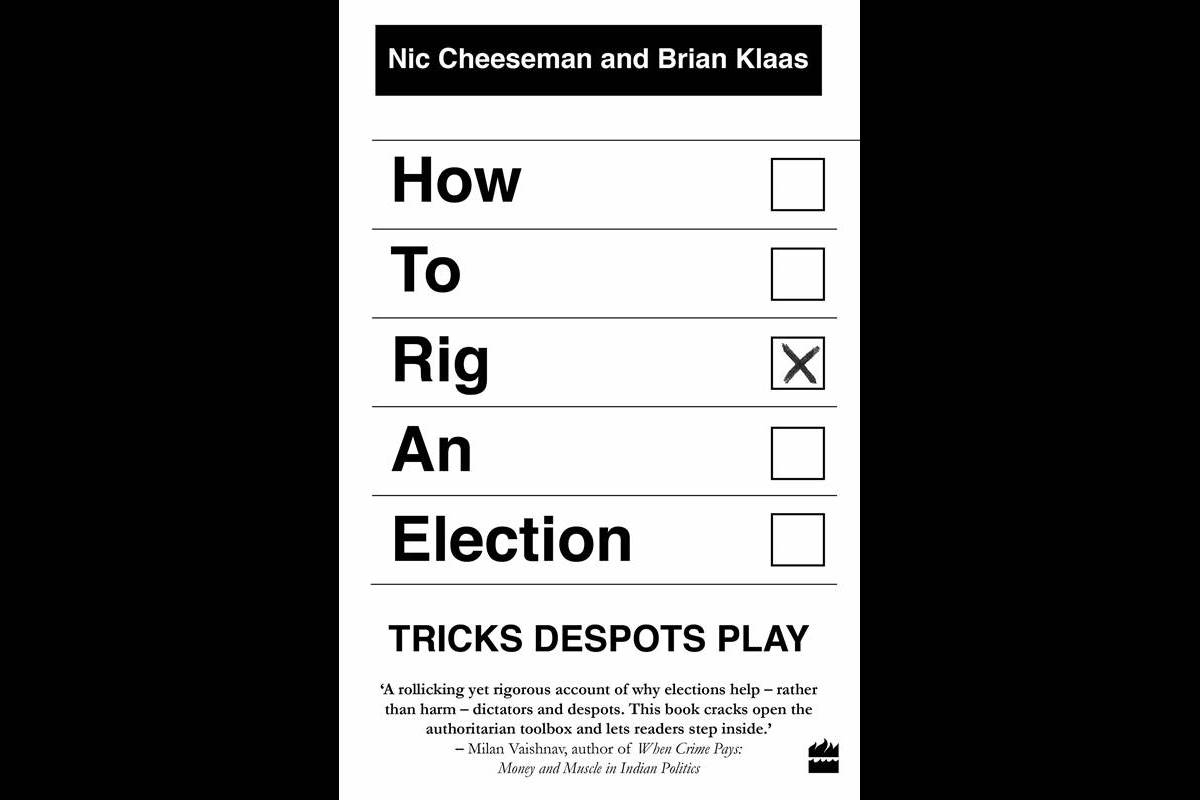Trump issues ‘last warning’ to Hamas as US confirms direct hostage talks
US President Donald Trump has issued what he called a "last warning" to Hamas to release the hostages being held in Gaza.
Cheeseman and Klaas, who have used neo-colonial stereotyping in this book, would have done better to propose that Indian teams are sent to evaluate elections in the West and the Election Commission of India be taken as an universal standard. But the western viewpoint and propensity to pontificate remain incorrigible

Book: How to rig an election
Authors: Nic Cheeseman & Brian Klaas
Publisher: Harper Collins India
Price: Rs 599
Two British authors produce a check-list of how elections can be rigged in favour of the ruling authority, details of which are known to every election observer group, in many of which this reviewer has participated. This book, though of last year’s vintage, is timely here in view of the coming elections in which the opposition has made accusations, inter alia, about electronic voting machines (EVMs). The authors claim that the world is becoming less democratic; a view cogently adduced by David Runciman (my review of How Democracy Ends, 9 September 2018) but this is not a trend due mainly to flawed elections but disillusionment with politicians and growing economic and social inequality in all countries.
Advertisement
The authors being Euro-and-Westcentric, concentrate as may be expected, on flaws in the developing world and the post-Soviet countries ~ so described 30 years after the demise of the Soviet Union. And infirmities are not hard to find due to ‘authoritarian’ leaders in such states’, with Asia, Africa and post-communist states rating only 5 on a scale of 10. A large number of countries in the Third World are covered in this book to show the erosion of democracy despite a now near-universal use of the election process and the widespread multiparty system. Six features of rigging are cited ~ gerrymandering, vote buying, repression, hacking, box-stuffing and hoodwinking the so-called international community, by which of course the authors mean the West. From avoiding elections, today’s autocrats choose to rig them. In such states only a small fraction of elections leads to political change. The proportion of countries with a presidential as opposed to a parliamentary system has increased from 25 per cent in 1970s to over 50 per cent today.
Advertisement
The benefits to the leaders who manipulate elections are listed as international respectability, to get aid and loans, for domestic public relations, to obtain tighter control, and to eject undesirables in the party.
Indian readers will be appalled at the scant mention of Indian democracy despite being the largest world electorate and an older democracy than many European countries now regarded by the authors as exemplars. The authors describe India patronisingly as a free though “fragile” system, though they call Pakistan partly free and Brazil free, both of which are highly contestable. In our neighbour, the army plays a major role, and in Brazil, they lock up the leading candidate on trumped-up charges. Excluding the USA, the Indian politician spends the most money to get elected.
Needless to say, the authors while seeing the mote in the Third World, fail to see the beam in their part of the world, and the most they will admit is “some discrepancies” in the elections of USA and UK. This is euphemism, despite the role of money-power, the completely flawed George W Bush second-term election and the manipulated exclusion of a large number of minority voters from Trump’s election. As for UK, political philosopher A.C. Grayling has pointed to the exclusion of a crucial section of the electorate in the Brexit referendum, quite apart from the unchecked activities of Cambridge Analytica.
While the book deals at length with alleged Russian interference in Trump’s election, no mention is made of flagrant American interference in the election and political processes of perceived unfriendly states. The bias becomes clear when the West appears satisfied at any election result in the Third World which the opposition wins, or where an ally continues to rule despite crooked means. Western financial and political support are regarded by the authors as safeguards for pristine democracy and the International Criminal Court is given importance, though widely believed to be a costly failure and its days probably numbered. Equally outdated is the western (read USA, France and UK) propensity to intervene in the “responsibility to protect” the cause of human rights, due to its flagrant illegality and disastrous consequences. The authors bewail that ‘counterfeit democracies’ are now in a majority of states, and the West’s support for democracy is ebbing when placed against their security interests.
No election is free and fair; there are only shades of white and grey and black. A freelance hacker in Colombia for 14 years secured the election of right-wing leaders in Latin America. Digital technology has to be handled with safeguards; three of 14 nations using EVMs have discontinued them. The best solutions are an effective election commission and civil society monitors. The Carter Centre, EU and OSCE are given credit for their election work, but let it be recalled when the US presses for regime change in Caracas, that Jimmy Carter claimed that Chavez of Venezuela was the best election he had ever witnessed. Cheeseman and Klaas, who have used neo-colonial stereotyping in this book, would have done better to propose that Indian teams are sent to evaluate elections in the West and the Election Commission of India be taken as an universal standard. But the western viewpoint and propensity to pontificate remain incorrigible.
(The reviewer is India’s former foreign secretary)
Advertisement